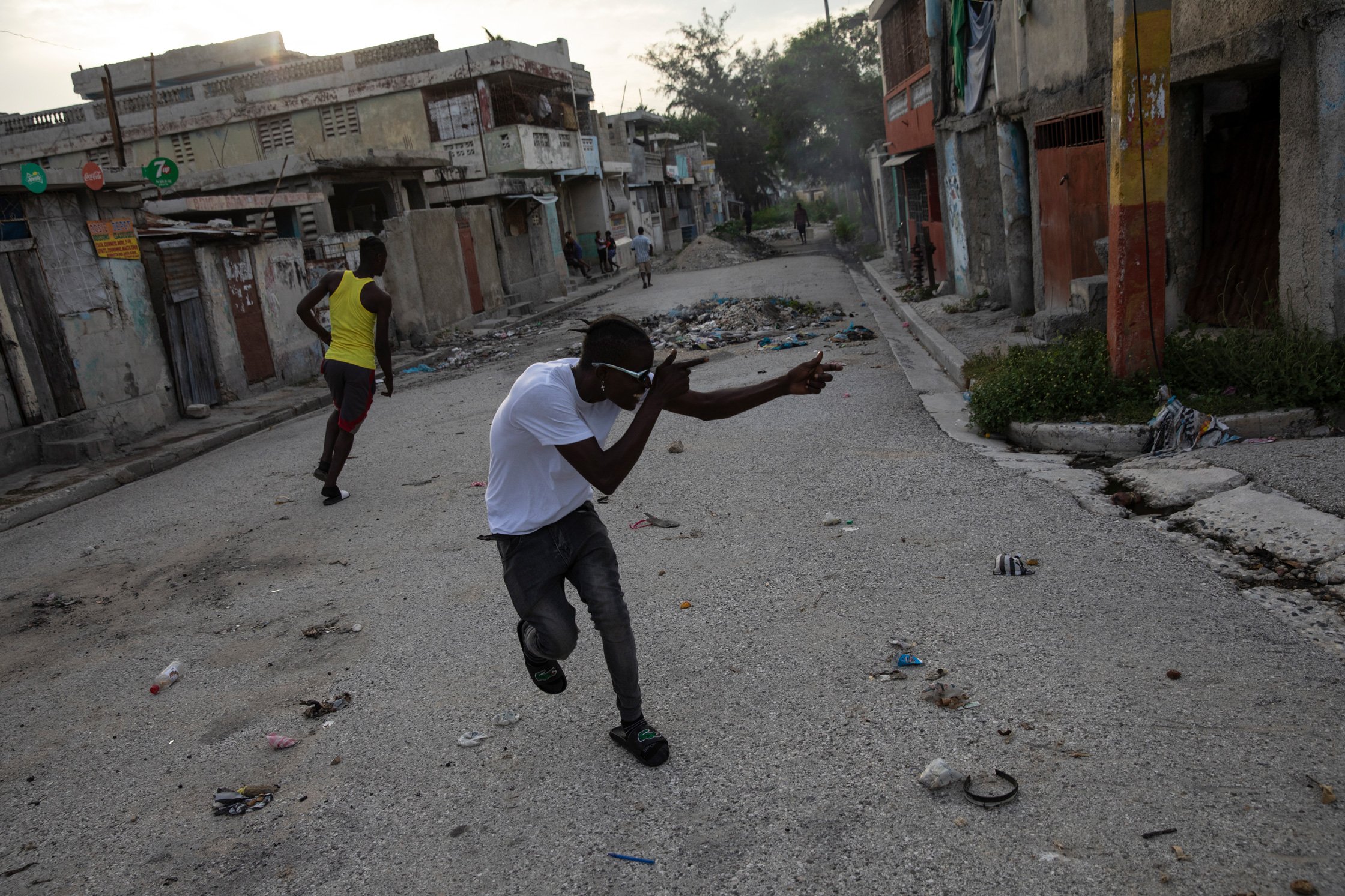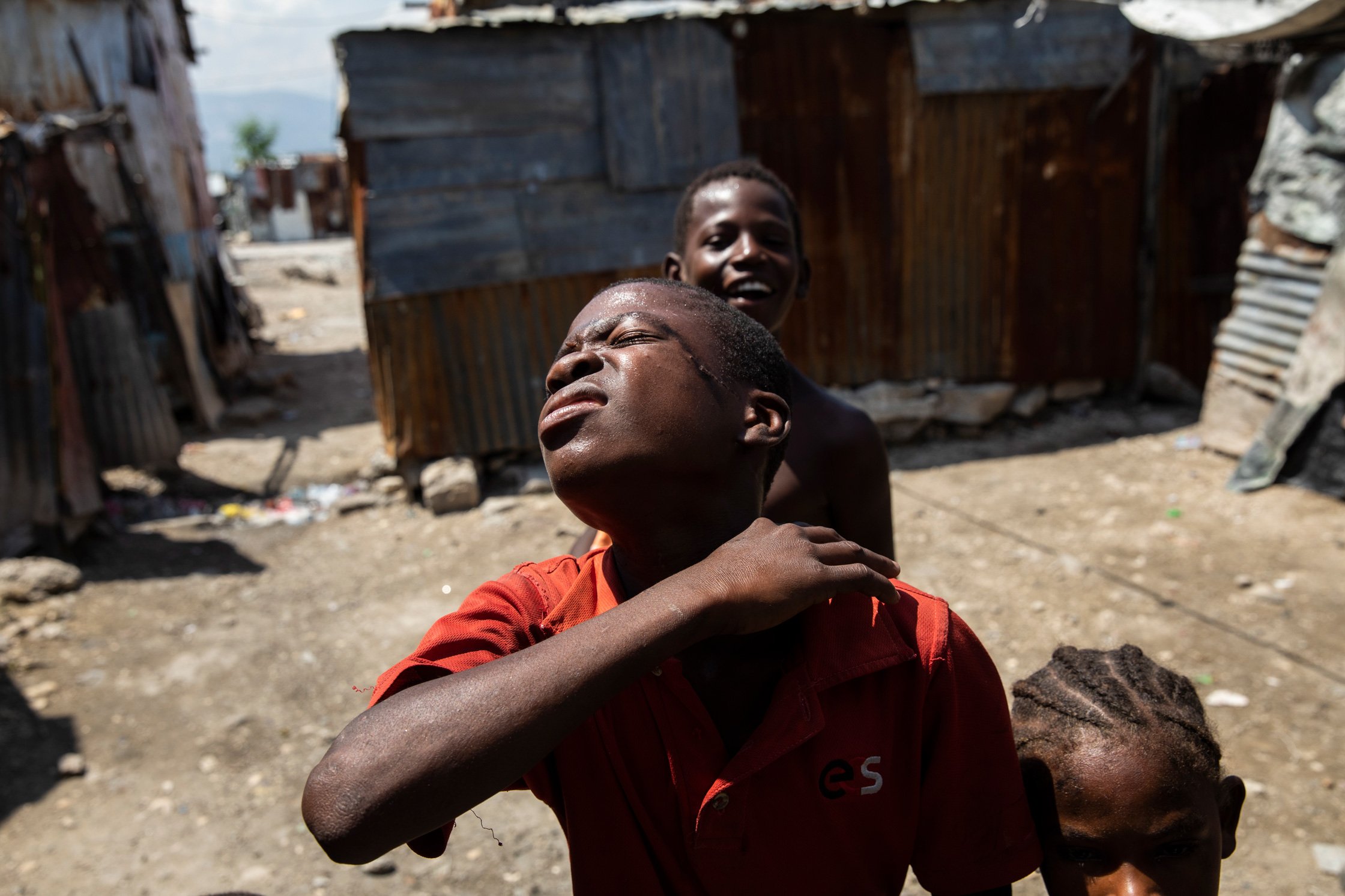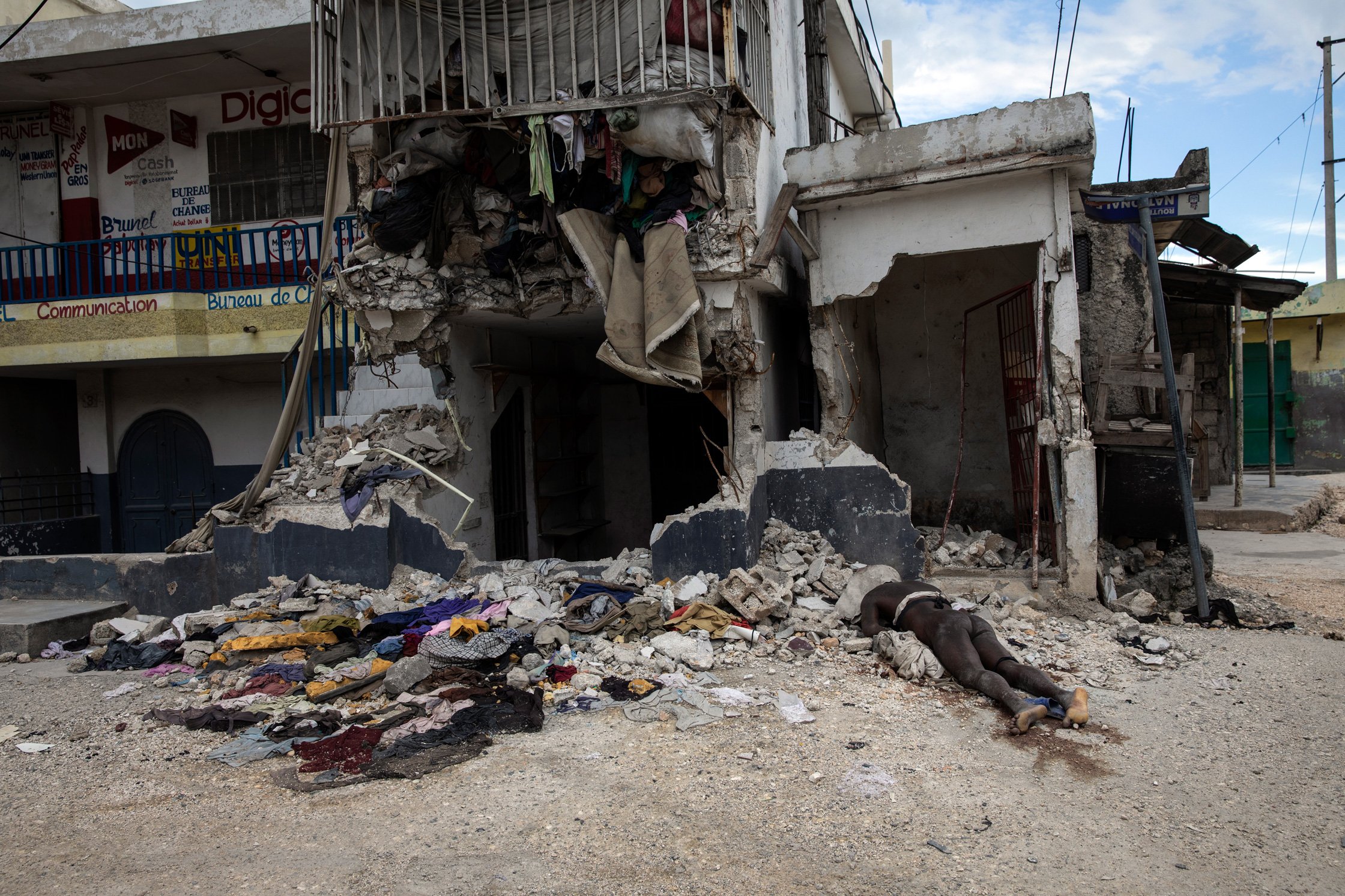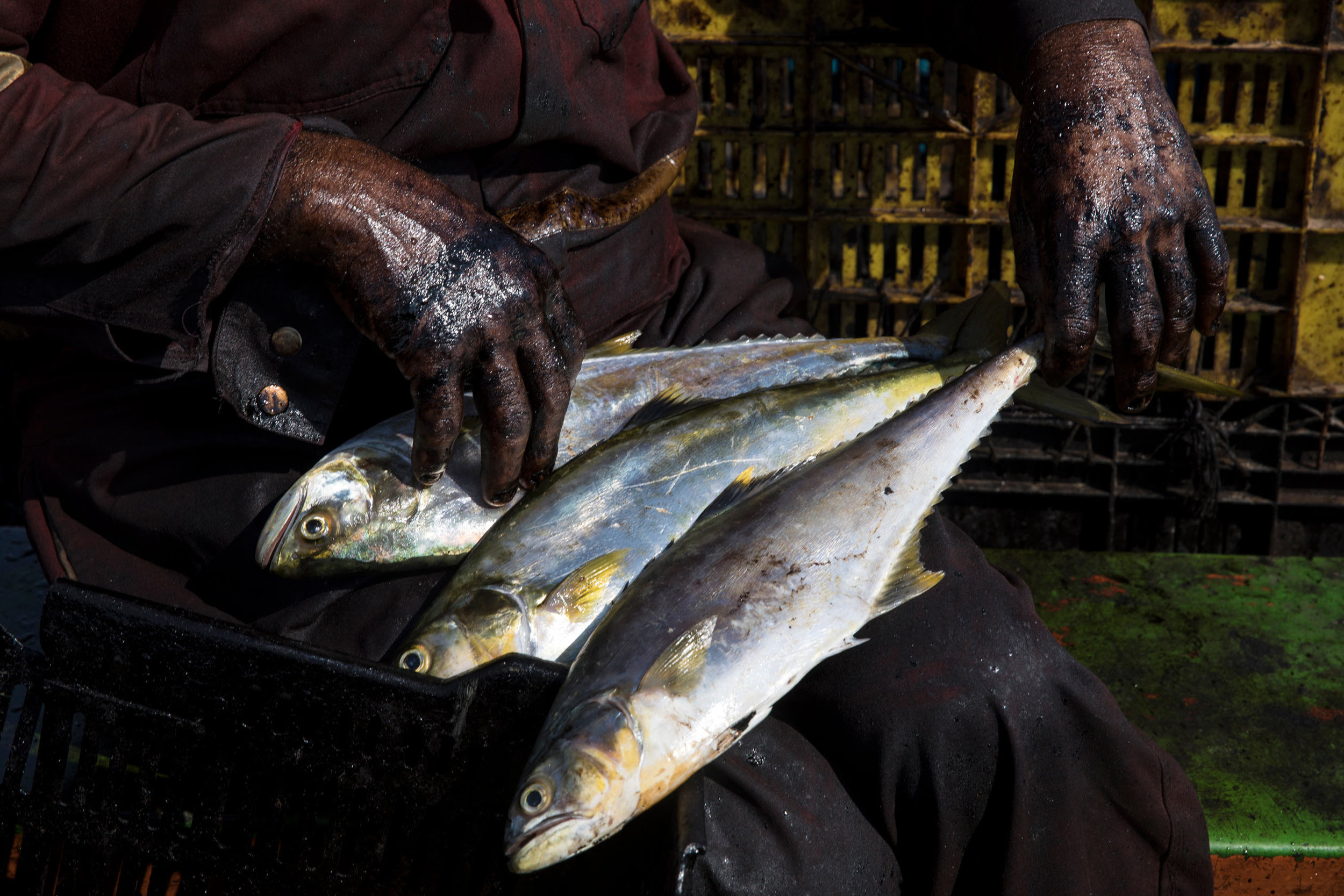"No photo!": A visual essay of Haiti

Haiti is not one story. It is many stories -- overlapping, colliding, advancing relentlessly to violent and heartbreaking endings.
The rich and the desperately poor. The brutal and the brutalized. Uneasily and sometimes murderously, they share half an island that is a magnet for natural disasters.
Photographer Rodrigo Abd, working with reporter Alberto Arce, spent four weeks in Haiti and came away with a kaleidoscopic collection of images -- fragments of slices of life in a tumultuous land.
_____
This story was produced with support from the Pulitzer Center on Crisis Reporting.
____
From the beginning, they spent days riding a motorbike around garbage-strewn, dirt streets of the violent, coastal neighborhoods of Cité Soleil, La Saline, Bel Air, and Martissant.
One Saturday evening, after a shootout between policemen and a gang, Abd saw a corpse laying face-down in the street with passersby averting their gazes in a common form of self-defense: See no evil to save yourself.
The pedestrians also covered their faces in the presence of a photographer. Abd quickly learned that most Haitians, but particularly the poor, didn’t want to be photographed — not by a white man and certainly not for free.
“No photo. No money. I want no pictures. I don’t want to see you. I don’t want to talk to you.” These were the phrases Abd heard over and over.
A boy talks about how poor he is, in the Cite Soleil shanty town of Port-au-Prince, Haiti, Friday, Oct. 1, 2021. (AP Photo/Rodrigo Abd)
The measures that had served him well during two decades of photojournalism -- seeking permission, demonstrating respect and empathy — were not going to be enough in Haiti. Abd encountered constant hostility, even violence, toward a white man with a camera.
On the other hand, Abd won rare access to the homes of the well-to-do who live in Pétion-Ville, on the top of a mountain overlooking the bay of Port-au-Prince.
In the past, they have been reluctant to show their faces and lifestyles to the media, but now they want to be seen. They feel they have something to say. Following the assassination of President Jovenel Moïse last summer, many among the elite have given up hope and abandoned the island. Some are still here and still doing business.
“Once you have invested in a place and a hundred workers depend on you, how can you leave? There is no way back,” said one who remained behind.
Businesswoman Magalie Dresse entertains guests during a cocktail party at her home in Port-au-Prince, Haiti, Wednesday, Sept. 15, 2021. (AP Photo/Rodrigo Abd)
In the dense gardens of La Reserve restaurant, contestants in a beauty pageant also want to be seen. They aspire to the title of Miss Haiti to represent their country at the Miss World contest. They rehearse on a catwalk, practiced elegance protected from gangs by armed guards around the perimeter.
The contrasts are poignant.
On one of his last days in Haiti, Abd traveled past the last shantytowns of Port au Prince to a previously agreed meeting point north of the airport, where three gang members appeared from behind a cluster of trees. Their faces were covered by rolled up T-shirts and their distrust was such that they asked Abd to lift his shirt: they were not checking for guns but for a hidden camera.
The gang members wanted to convey a message: There is no pride in being a gunman. There is no work, there are no opportunities. If there were, they would not do what they do.
For these young people, the last in line, gangs are the only way to work in Haiti, a homeland swallowed by poverty.
An amputee, wearing a necklace adorned with charms depicting a phoenix and a machine gun, waits for faithful to exit the Saint Peter's Catholic church to beg for alms, in Port-au-Prince, Haiti, Tuesday, Sept. 28, 2021. (AP Photo/Rodrigo Abd)
Throughout his time in Haiti, Abd moved about with his hand on his camera, but even before he could raise it he would hear the chorus of “No photo!” It came from the people he was talking to and from those just passing by. Many also wouldn’t give their names. They would consider trading a picture for cash, but no cash, no photo. The message was clear. Why would they help a foreign journalist make money off of their image while they have little to eat? They had nothing else to sell.
They also make a gesture along with “No photo!” — a finger drawn across the neck from left to right, like a fatal knife slice. Abd saw it many times. And he understood. It may be a death threat, but it’s also a statement of need, an indication that while the photographer is bent on capturing the moment, the person he sees in the viewfinder has more basic needs.
And for the moment, that person controls his own story.
Gang members use hand towels to conceal their identity as they arrive to attend the funeral of fellow gang member Tonino Manino, in Port-au-Prince, Thursday, Sept. 30, 2021. (AP Photo/Rodrigo Abd)
A resident points to a bullet hole in a wall as he explains how police opened fire on musicians, killing one of them because police thought they were carrying real weapons, during a protest asking for justice in Port-au-Prince, Haiti, Wednesday, Sept. 22, 2021. (AP Photo/Rodrigo Abd)
A neighbor describes the poverty in which she lives outside her house built with recycled metal sheets in the Cite Soleil shanty town of Port-au-Prince, Haiti, Friday, Oct. 1, 2021. (AP Photo/Rodrigo Abd)
Businesswoman Magalie Dresse takes a break from her garden cocktail party to accept a phone call at her home in Port-au-Prince, Haiti, Wednesday, Sept. 15, 2021. (AP Photo/Rodrigo Abd)
A gang member, wearing a balaclava and holding a gun, poses for a photo in the Portail Leogane neighborhood of Port-au-Prince, Haiti, Thursday, Sept. 16, 2021. There could be as many as 100 gangs in Port-au-Prince; no one has an exact count and allegiances often are violently fluid. (AP Photo/Rodrigo Abd)
A wall inside the Palace of Justice is spray-painted with a message that reads in Creole; "Down with insecurity", in Port-au-Prince, Haiti, Thursday, Sept. 16, 2021. (AP Photo/Rodrigo Abd)
A dress for sale hangs from a tree branch above the stall of a street vendor, in Port-au-Prince, Haiti, Thursday, Sept. 23, 2021. (AP Photo/Rodrigo Abd)
A mural, painted with the colors of the Haitian flag and the words ‘World Peace” blankets a wall in Port-au-Prince, Haiti, Wednesday, Oct. 6, 2021. (AP Photo/Rodrigo Abd)
Leader of La Piste's displaced residents, Joseph Dieu Faite, who is visually impaired, recalls the assault lead by police in June, at a shelter for the internally displaced in Port-au-Prince, Haiti, Friday, Sept. 17, 2021. (AP Photo/Rodrigo Abd)
A gang member, wearing an imitation Rolex watch, speaks during an interview on the outskirts of Port-au-Prince, Wednesday, Oct. 6, 2021. (AP Photo/Rodrigo Abd)
Models pose for the photo showing a brand of leather handbags from a Haitian designer during an event a week before the selection of Miss Haiti in Port-au-Prince, Haiti, Sunday, Sept. 26, 2021. (AP Photo/Rodrigo Abd)
Haiti's Prime Minister Ariel Henry talks to reporters during an interview with the Associated Press at his private residence in Port-au-Prince, Tuesday, Sept. 28, 2021. (AP Photo/Rodrigo Abd)
A poster depicting Haiti’s President Jovenel Moise, who was assassinated in July, towers over an avenue in Port-au-Prince, Haiti, Tuesday, Sept. 28, 2021. (AP Photo/Rodrigo Abd)
A model poses for a photo during an event a week before the selection of Miss Haiti, in Port-au-Prince, Haiti, Sunday, Sept. 26, 2021. (AP Photo/Rodrigo Abd)
A man cuts wood to feed the oven at the Bongu bakery in the Bel Air neighborhood of Port-au-Prince, Haiti, Monday, Sept. 27, 2021. (AP Photo/Rodrigo Abd)
A house built with recycled metal sheets is seen in the La Saline shanty town of Port-au-Prince, Haiti, Monday, Sept. 13, 2021. (AP Photo/Rodrigo Abd)
Businesswoman Magalie Dresse does a head stand during her yoga practice in the garden of her house in Port-au-Prince, Haiti, Tuesday, Sept. 14, 2021. “I start the day like this because I need the strength to go out there and handle what I'm going to find, which is not going to be positive”, said Magali to The Associated Press. (AP Photo/Rodrigo Abd)
Children stand inside one of the facilities inside the orphanage Centre D'accueil, in Carrefour, Port-au-Prince, Haiti, Saturday, Sept. 18, 2021. (AP Photo/Rodrigo Abd)
Jean Murat, who works for the Directorate of Migration and Emigration, crosses the street towards his shop in Port-au-Prince, Tuesday, Sept. 28, 2021. (AP Photo/Rodrigo Abd)
A gang member, carrying a handgun in the waistband of his pants,†talks to The Associated Press, in a field on the outskirts of Port-au-Prince, Haiti, Wednesday, Oct. 6, 2021. (AP Photo/Rodrigo Abd)
The corpse of a man killed during clashes between the police and gang members lies among rubble in Martissant, in Port-au-Prince, Haiti, Saturday, Oct. 2, 2021. (AP Photo/Rodrigo Abd)
Photos by Rodrigo Abd
Visual artist and Journalist





























